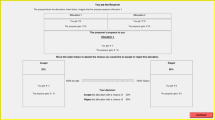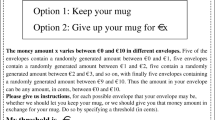Abstract
Despite 10 years of research on behavior in hypothetical referenda, conflict remains in the literature on whether or not the mechanism generates biased responses compared to real referenda, and the nature and source of any such bias. Almost all previous inquiry in respect of this issue has concentrated on bias at the aggregate level. This paper reports a series of three experiments which focuses on bias at the individual level and how this can translate to bias at the aggregate level. The authors argue that only an individual approach to hypothetical bias is consistent with the concept of incentive compatibility. The results of these experiments reflect these previous conflicting findings but go on to show that individual hypothetical bias is a robust result driven by the differing influence of pure self-interest and other- regarding preferences in real and hypothetical situations, rather than by a single behavioral theory such as free riding. In a hypothetical situation these preferences cause yea-saying and non-demand revealing voting. This suggests that investigation of individual respondents in other hypothetical one-shot binary choices may also provide us with insights into aggregate behavior in these situations.
Similar content being viewed by others
References
Arrow KJ, Solow R, Portney P, Leamer EE, Radner R, Schuman H (1993). Report of the NOAA panel on contingent valuation. Fed Regist 58: 4602–4614
Bjornstad D, Cummings R, Osborne L (1997). A learning design for reducing hypothetical bias in the contingent valuation method. Environ Resour Econ 10: 207–221
Brown TC, Ajzen I, Hrubes D (2003). Further tests of entreaties to avoid hypothetical bias in referendum contingent valuation. J Environ Econ Manage 46: 353–361
Cummings RG, Elliott S, Harrison GW, Murphy J (1997). Are hypothetical referenda incentive compatible?. J Polit Econ 105: 609–621
Cummings RG, Taylor LO (1999). Unbiased value estimates for environmental goods: a cheap talk design for the contingent valuation method. Am Econ Rev 89: 649–665
Fleiss JL (1981). Statistical methods for rates and proportions. Wiley, New York
Fleiss JL, Cuzick J (1979). The reliability of dichotomous judgments: unequal numbers of judges per subject. Appl Psychol Meas 3: 537–542
Landis JR, Koch G (1977). The measurement of observer agreement for categorical data. Biometrics 33: 159–174
List JA, Gallet CA (2001). What experimental protocol influence disparities between actual and hypothetical stated values?. Environ Resour Econ 20: 241–254
Little J, Berrens R (2004). Explaining disparities between actually and hypothetical stated values: further investigation using meta-analysis. Econ Bull 3: 1–13
Murphy JJ, Allen PG, Stevens TH, Weatherhead D (2005). A meta-analysis of hypothetical bias in stated preference valuation. Environ Resour Econ 30: 313–325
Smith VK (1999). Of birds and books: more on hypothetical referenda. J Polit Econ 107: 197–200
Taylor LO, McKee M, Laury SK, Cummings RG (2001). Induced value tests of the referendum voting mechanism. Econ Lett 71: 61–65
Vossler CA, Kerkvliet J (2003). A criterion validity test of the contingent valuation method: comparing hypothetical and actual voting behavior for a public referendum. J Environ Econ Manage 45: 631–649
Author information
Authors and Affiliations
Corresponding author
Additional information
Alphabetical list of authors no seniority of authorship attributed.
Rights and permissions
About this article
Cite this article
Burton, A.C., Carson, K.S., Chilton, S.M. et al. Resolving questions about bias in real and hypothetical referenda. Environ Resource Econ 38, 513–525 (2007). https://doi.org/10.1007/s10640-007-9095-6
Accepted:
Published:
Issue Date:
DOI: https://doi.org/10.1007/s10640-007-9095-6
Keywords
- Experimental economics
- Real referenda
- Hypothetical referenda
- Demand revelation
- Hypothetical bias
- Non-market valuation




